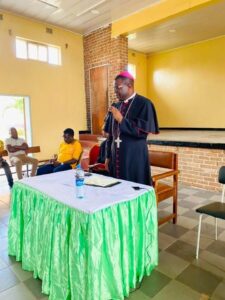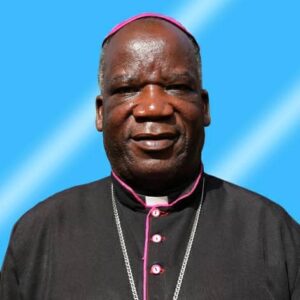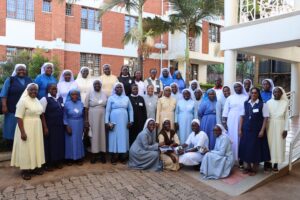ETHIOPIA: Decreasing migration through increased employment opportunity locally
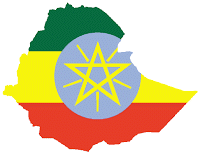
By Makeda Yohannes, CBCE Communications and Public Relation Officer
The Ethiopian Catholic Church Social and Development Commission (Caritas Ethiopia) has devised a strategy meant to discourage rural-urban migrations of young people in search of employment.
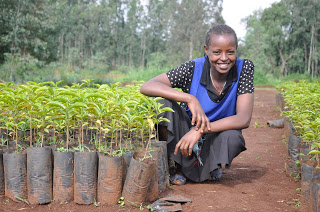
The project which is currently being implemented with the support from European Union and Caritas Belgium is successfully improving the lives of unemployed youth living in the rural areas of the Apostolic Vicariate of Soddo, Southern Ethiopia. The Commission is implementing Supporting Horn of Africa Resilience (SHARE) project in three districts in Wolayta Zone of the Southern Nations, Nationalities and People’s Regional State from where thousands of young women and men flock to cities and even migrate to other countries every year in search of employment opportunities and better life style.
Shuye Humba Youth group is one of the youth groups organized by the project in Boloso Sore District, which comprises 8 young women and men who were struggling to make ends meet and look forward for a better future. The project has organized the youths to raise seedlings of different variety, pay them wages as daily labourers and support them with different seedling nursery materials and tools.
Addisu Mutturu, head of the team explained that using the savings from their daily wages from selling seedlings they have now extended their business to poultry production and cattle breeding. “Among us we have divided work schedule and we work day and night because we have seen the difference running our business can bring in our lives. When we first began people said to us that we were wasting our time and we would not be successful but we were not discouraged and continued to strive within just a year look at what a different story it has become,” he said.
He explained that they were organized to raise seedlings and with the money they earned they began poultry production. Again with their savings and without even taking out a loan they managed to buy 16 oxen for fattening and they continue to work hard looking forward to an even successful future. Talking about his personal experience he said that he has gone through many up and downs after completing high school and was not successful in the entrance exam to for University.
“I could not get a job here in my village so I went to the capital city Addis Ababa, life there was very difficult. I was working as a chest vendor and an assistant for a taxi; I became addicted and was abusing many substances. The money I made was so little I spent many days involved in petty theft because I had to eat,” he explained.
When he realized there could be no future in staying at the capital Addisu returned to his home town and he was given the opportunity to be a beneficiary in the project.
“Now I am working every day and I am getting a sufficient return, I am even contributing for my family’s household. I realize that being employed by the government and migrating are not the only means and if you work hard enough there are many opportunities to for making money and growing right in my home village,” said Addisu.
SHARE focuses to empower women and young people economically by creating alternative means of income at their localities. The intervention encourages youth to save 20% of start-up capital, injects the remaining 80% by facilitating and linking them with the local microfinance institution as well as trains them on business plan and management and encourages beneficiaries to develop the culture of saving through small saving groups.
After selecting the unemployed young men and women through discussion with the local administration and the community as beneficiaries, the project organizes them in small groups and gives them entrepreneurial trainings. Then the unemployed youth are given the opportunity to select the best type of business that is suitable for their local context. Accordingly, the youth groups are given a start-up fund in addition to their savings to begin their small scale business.
Alemitu Alemu is also a member of the same group as Addisu. After failing to complete high school she migrated to Hawassa town hoping to get employed. Unfortunately, she could not find a job and resolved to selling peanuts on the street to sustain herself. She recalled that life for a female in the streets was very difficult; she decided to return to her village and stay there for a while before moving to another town in search of employment.
Before she left she was given the opportunity to be a beneficiary member of the group. Now she earns a monthly income enough to sustain her and even manages to save some amount in their savings group.
“I am now working just as hard as the males in my group and every day our groups financial capacity is growing and we plan to expand our business even more. Thanks to the project the idea of migrating is completely out of my mind, at this moment I am not worried about poverty but my mind is occupied with thoughts of growing and improving only. Today is great and tomorrow will be better,” she said.
According to Melese Morebo, who before joining the group was not able to support his family, the group gets together regularly to discuss their next move and which sector would be better to invest in. Moreover, they share the work burden equally among themselves.
“It is because we have developed the culture of working collaboratively without holding back our skills and our strength in contributing to the growth of our business that we have achieved this progress. We strictly follow our working rules and we take advice of the project officers into account as they do have better experience than us,” said Melese.
Mr Abera, a representative of Damot Pulasa district said that the group is a model success story. He said that the Catholic Church Social and Development Commission is mainly successful with instilling the attitude of looking towards alternative means of income and hard work in the minds of the young people. He said this is achieved through the various workshops and training sessions and the practical success they are witnessing in their own lives. He said the commission’s project officers work hand in hand with all the beneficiary youth groups’ day in day out and highly contribute to the ongoing growth of the groups.
“We are particularly proud of ECC SDCO’s staff, they share their skills with the youth groups without holding back. This is witnessed in the careful and successful decisions the youth groups are making in selecting a profitable business sector to invest in based on their local context,” explained Mr. Abera.
∽End∽
